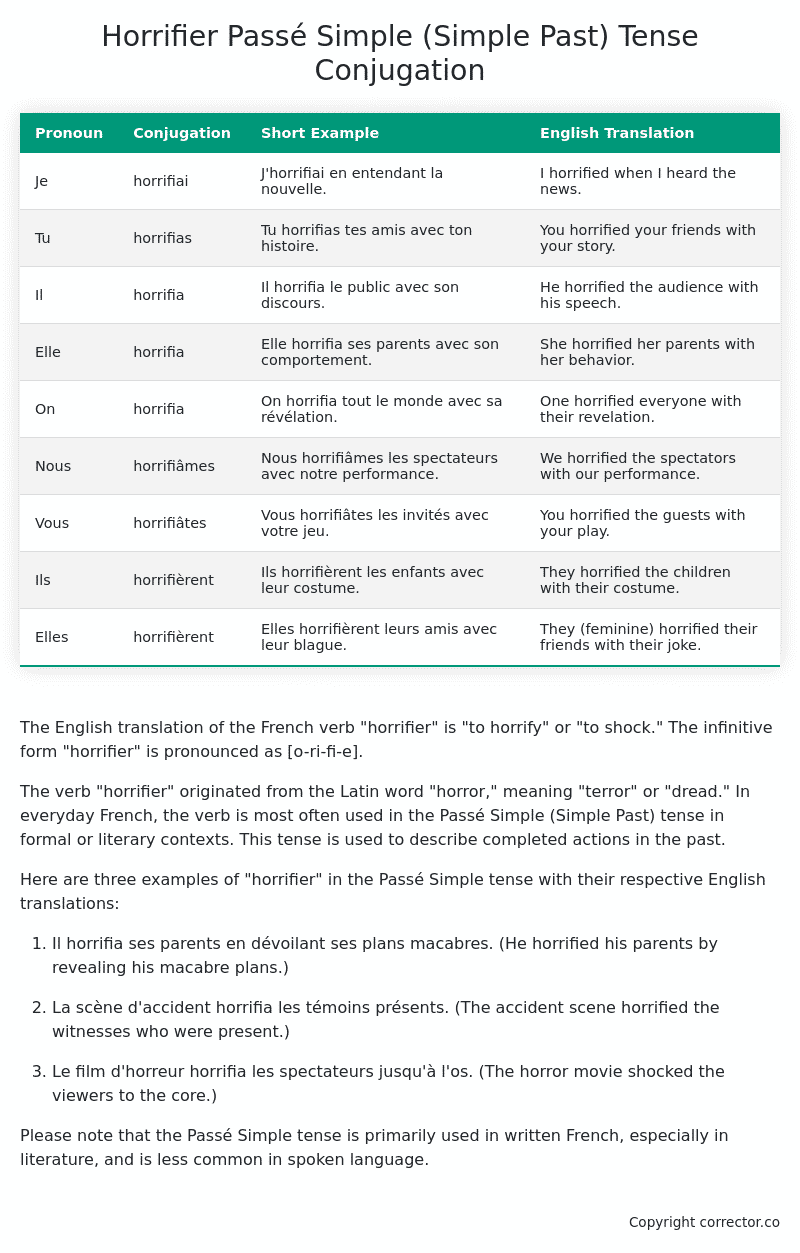Passé Simple (Simple Past) Tense Conjugation of the French Verb horrifier
Introduction to the verb horrifier
The English translation of the French verb “horrifier” is “to horrify” or “to shock.” The infinitive form “horrifier” is pronounced as [o-ri-fi-e].
The verb “horrifier” originated from the Latin word “horror,” meaning “terror” or “dread.” In everyday French, the verb is most often used in the Passé Simple (Simple Past) tense in formal or literary contexts. This tense is used to describe completed actions in the past.
Here are three examples of “horrifier” in the Passé Simple tense with their respective English translations:
-
Il horrifia ses parents en dévoilant ses plans macabres.
(He horrified his parents by revealing his macabre plans.) -
La scène d’accident horrifia les témoins présents.
(The accident scene horrified the witnesses who were present.) -
Le film d’horreur horrifia les spectateurs jusqu’à l’os.
(The horror movie shocked the viewers to the core.)
Please note that the Passé Simple tense is primarily used in written French, especially in literature, and is less common in spoken language.
Table of the Passé Simple (Simple Past) Tense Conjugation of horrifier
| Pronoun | Conjugation | Short Example | English Translation |
|---|---|---|---|
| Je | horrifiai | J’horrifiai en entendant la nouvelle. | I horrified when I heard the news. |
| Tu | horrifias | Tu horrifias tes amis avec ton histoire. | You horrified your friends with your story. |
| Il | horrifia | Il horrifia le public avec son discours. | He horrified the audience with his speech. |
| Elle | horrifia | Elle horrifia ses parents avec son comportement. | She horrified her parents with her behavior. |
| On | horrifia | On horrifia tout le monde avec sa révélation. | One horrified everyone with their revelation. |
| Nous | horrifiâmes | Nous horrifiâmes les spectateurs avec notre performance. | We horrified the spectators with our performance. |
| Vous | horrifiâtes | Vous horrifiâtes les invités avec votre jeu. | You horrified the guests with your play. |
| Ils | horrifièrent | Ils horrifièrent les enfants avec leur costume. | They horrified the children with their costume. |
| Elles | horrifièrent | Elles horrifièrent leurs amis avec leur blague. | They (feminine) horrified their friends with their joke. |
Other Conjugations for Horrifier.
Le Present (Present Tense) Conjugation of the French Verb horrifier
Imparfait (Imperfect) Tense Conjugation of the French Verb horrifier
Passé Simple (Simple Past) Tense Conjugation of the French Verb horrifier (You’re reading it right now!)
Passé Composé (Present Perfect) Tense Conjugation of the French Verb horrifier
Futur Simple (Simple Future) Tense Conjugation of the French Verb horrifier
Futur Proche (Near Future) Tense Conjugation of the French Verb horrifier
Plus-que-parfait (Pluperfect) Tense Conjugation of the French Verb horrifier
Passé Antérieur (Past Anterior) Tense Conjugation of the French Verb horrifier
Futur Antérieur (Future Anterior) Tense Conjugation of the French Verb horrifier
Subjonctif Présent (Subjunctive Present) Tense Conjugation of the French Verb horrifier
Subjonctif Passé (Subjunctive Past) Tense Conjugation of the French Verb horrifier
Subjonctif Imparfait (Subjunctive Imperfect) Tense Conjugation of the French Verb horrifier
Subjonctif Plus-que-parfait (Subjunctive Pluperfect) Tense Conjugation of the French Verb horrifier
Conditionnel Présent (Conditional Present) Tense Conjugation of the French Verb horrifier
Conditionnel Passé (Conditional Past) Tense Conjugation of the French Verb horrifier
Conditionnel Passé II (Conditional Past II) Tense Conjugation of the French Verb horrifier
L’impératif Présent (Imperative Present) Tense Conjugation of the French Verb horrifier
L’impératif Passé (Imperative Past) Tense Conjugation of the French Verb horrifier
L’infinitif Présent (Infinitive Present) Tense Conjugation of the French Verb horrifier
L’infinitif Passé (Infinitive Past) Tense Conjugation of the French Verb horrifier
Le Participe Présent (Present Participle) Tense Conjugation of the French Verb horrifier
Le Participe Passé (Past Participle) Tense Conjugation of the French Verb horrifier
Struggling with French verbs or the language in general? Why not use our free French Grammar Checker – no registration required!
Get a FREE Download Study Sheet of this Conjugation 🔥
Simply right click the image below, click “save image” and get your free reference for the horrifier Passé Simple tense conjugation!

Horrifier – About the French Passé Simple (Simple Past) Tense
Formation
Usage
Narration
Historical Context
Interactions with other tenses
Passé Composé
Imparfait
Conditional and Subjunctive
Summary
I hope you enjoyed this article on the verb horrifier. Still in a learning mood? Check out another TOTALLY random French verb conjugation!


